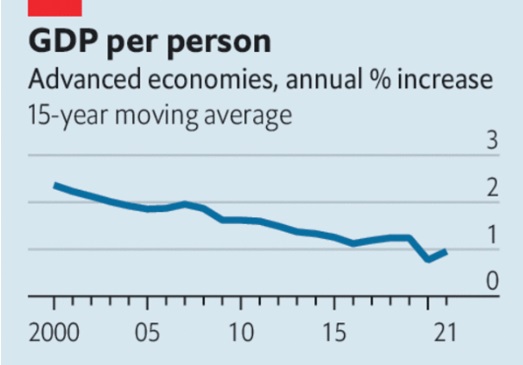January 9, 2023 by Dan Mitchell @ International Liberty
Back in 2016, I shared three videos to explain the theory of “public choice,” which is simply the application of economic principles to understand the self-interested behavior of politicians, bureaucracies, and voters.
Wonky readers will enjoy this fourth video.
I’m citing public choice because the Economist, in a recent article, shared a very depressing chart about the decline of economic growth in the developed world.
As you can see, the average increase in per-capita economic output has dropped by more than 50 percent since the turn of the century.
From a policy perspective, there’s a very simple explanation.
As explained in this fascinating video, the western world enjoyed pro-growth policies of the 1980s and 1990s. You can credit Reagan and Thatcher or you can credit the “Washington Consensus.”
Unfortunately, the opposite has happened in the 21st century. The United States has moved toward statism and the same is true for Japan and most of Western Europe.
So it’s no surprise that growth has slowed in industrialized nations.
And it’s also no surprise (given the magazine’s ideological bent) that the Economist doesn’t really understand what’s been happening. Here are some excerpts from the article.
The long-run rate of growth has dwindled alarmingly, contributing to problems including stagnant living standards and fulminating populists. Between 1980 and 2000, gdp per person grew at an annual rate of 2.25% on average. Since then the pace of growth has sunk to about 1.1%. …The problem is that…reviving growth has slid perilously down politicians’ to-do lists. Their election manifestos are less focused on growth than before… Our analysis of political manifestos shows that the anti-growth sentiment they contain has surged by about 60% since the 1980s. Welfare states have become focused on providing the elderly with pensions and health care… Support for growth-enhancing reforms has withered. …unless they embrace growth, rich democracies will see their economic vitality ebb away and will become weaker on the world stage. Once you start thinking about growth, wrote Robert Lucas, a Nobel-prize-winning economist, “it is hard to think about anything else”. If only governments would take that first step. Moreover, even when politicians say they want growth, they act as if they don’t.
At the risk of being presumptuous, it’s not just a matter of thinking about growth. It’s also understanding the policies that produce growth.
And it’s also understanding how to get those pro-growth policies when politicians have big incentives to do the wrong thing. And this brings us back to public choice.
Let’s now look at some excerpts from a column in the Wall Street Journal by Alberto Mingardi.
'What would you do if you were the state?” So begins the greatest book of political theory you never read. “The State,” by the Hungarian-born economist Anthony de Jasay, was published in 1985… Jasay argued that particular leaders matter far less than might be supposed and that all governments ultimately seek to maximize their discretionary power. …Politicians differ, sometimes sharply, in ideas and character. But governments—like businesses—have basic structural tendencies. The state always seeks to expand. Redistribution, Jasay maintained, is “addictive.” The moment government starts giving out goodies, the mechanisms undergirding society and the economy change. Corporations and interest groups have a new incentive to work to win the state’s favor. So businesses tend to shift resources and attention from engineers to lawyers, from serving customers to capturing decision makers. “The greater the reach of the state, the greater is the scope for profiting from its commands,” Jasay wrote.
Sadly, I don’t have any easy solutions. Once people learn they can vote themselves money, it is very hard to rescue a society.
But I know that protecting and promoting jurisdictional competition is part of the answer if we want to avoid the problem of “goldfish government.”
P.S. For more public choice-related analysis, I recommend these three videos.
P.P.S. For more about politicians, click here and here.

No comments:
Post a Comment